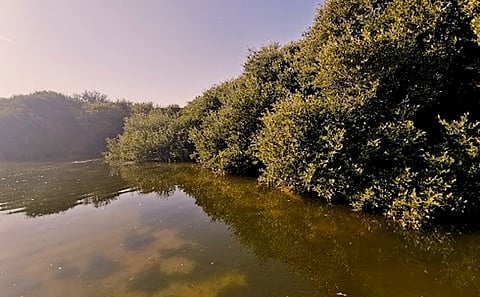Alba Backs Development of Ras Sanad Mangrove Nursery Project
To support the decarbonisation drive in Bahrain, Aluminium Bahrain (Alba) CEO Ali Al Baqali announced the company’s support to the National Initiative for Agricultural Development and the Supreme Council for Environment’s efforts in Ras Sanad Mangrove Nursery.
The announcement was made at a meeting with NIAD’s Secretary-General Shaikha Maram bint Isa Al Khalifa on Thursday.
Al Baqali presented a cheque of BD134,000 to NIAD’s Secretary-General, which will aid NIAD’s joint efforts with the Supreme Council for Environment in biodiversity protection through the Ras Sanad Mangrove Nursery Project as part of the ‘Forever Green’ National Campaign.
Several top officials from Alba and NIAD were present during this meeting, following which the delegation was given a tour in Alba campus which included a special visit to Alba’s HRH Princess Sabeeka Oasis.
Bahrain Joins Partnership for Sustainable Economic Development
Al Baqali said: “Collectively we can make a difference. Every step, no matter how small it is, counts. "We fully endorse the objectives announced by HRH Prince Salman bin Hamad Al Khalifa, Prime Minister of Bahrain at COP26 which includes ‘quadrupling’ the mangrove coverage in Bahrain.
"We are also pleased to support the NIAD and the Supreme Council for Environment’s efforts in developing Ras Sanad Mangrove Nursery Project. Our backing to ESG initiatives was made possible thanks to our Chairman of the Board Shaikh Daij bin Salman bin Daij Al Khalifa.”
NIAD Secretary-General Shaikha Maram bint Isa Al Khalifa said: “We are pleased to receive Alba’s support for such an important project. We also thank Alba for leading by example to achieve the objectives of the Kingdom of Bahrain in relation to decarbonisation and climate change.”
Alba’s support for the Ras Sanad Mangrove Nursery Project is in line with its initiatives to achieve its Decarbonisation objectives - a priority area under its ESG Roadmap.
Read More: Bahrain Ranks Among Top 10 Performing MENA Ecosystems in GSER


